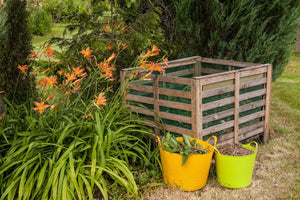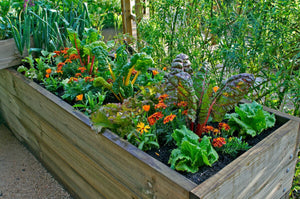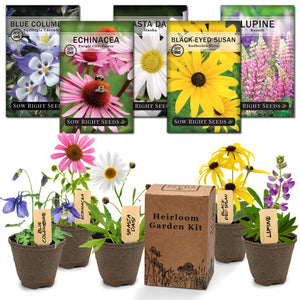Topics
Quick and Easy Home Compost Ratios for Nitrogen/Carbon Balance
CompostFiguring out the right compost ratios for your home composting doesn’t have to be a difficult chemistry equation. We’ll show you how to quickly determine the right balance of nitrogen to carbon components to create a great compost pile.

Creating Good Compost: How Hard Is It Really?
So you’ve got a compost bin, and you’re ready to get cooking! Luckily for you, composting is a lot easier than baking. Although there’s a sweet spot, you have a lot of wiggle room. You’ll figure out what works for you in no time.
Compost Ingredients: Browns & Greens
Compost has two main ingredients: carbon and nitrogen. Since everything you compost will have some of both, it’s common to categorize compost components into two categories: Browns and Greens.
Brown Compost Materials: Dense, carbon-rich materials that are typically dead and don’t have much moisture left in them. They are older and woodier. These can be anything from pine needles, fall leaves, paper shreds, cardboard, wood chips, straw, hay, corn stalks, or pine cones.
Green Compost Materials: Fresh items including grass clippings, food scraps, eggshells, coffee grounds, manure, etc. These items have more moisture and are nitrogen rich.
Why compost ratios are so confusing
Gardeners and scientists don’t always talk about the same things when they refer to compost ratios, and it can make your research a little confusing.
A scientist might tell you that the perfect ratio is 30:1 (Carbon: Nitrogen). But they’re talking about the actual chemical makeup of all of the ingredients of your compost. So it’s highly unlikely that this number is of any use to you.
How to Calculate C:N Ratios in Home Composting - The Easy Way
An easier rule of thumb is the “browns to greens” ratio, which is measuring volume, not chemical makeup. However, there’s still plenty of wiggle room! A general ratio of 3 parts brown to 1 part greens is ideal, but some people go as low as mixing half and half just to keep things simple.
How to tell when compost is ready
Take a deep breath.
If you’re still confused, take a deep breath. Literally. And pay attention.
Does something stink?
If you said yes, it’s time to add more browns to your compost! That’s right. A stinky compost bin is one of your best clues to getting things right. Too much wet, green material means too much nitrogen and moisture. Add something dry to mix things up.
On the other hand, with too much brown material, the decomposition process will slow down, and it will take longer for the compost to mature. Your material will be too dry and brown, and won’t generate enough heat.

The finishing touches: water & air
The microorganisms that break down your materials into compost need water and air, just like you do. You’ll need to make sure that they have that to do the hard work of decomposition.
If your compost has plenty of nitrogen-rich green materials but still seems dry, add a little water. This is a good idea if it hasn’t rained in a while. You want your compost pile to be damp but not wet.
To aerate your compost pile, turn it every 2-3 days for small piles and 7-14 days for larger piles, which generate heat faster and break down more quickly. Don’t overdo this, as you might cool your compost down, and it won’t decompose quickly. Ideally, compost should get to a temperature of 131+ degrees in the center and stay that hot for at least 15 days for optimum safety.
The bottom line about home compost ratios
Do not stress out about compost ratios or the perfect recipe. Remember, you’re just rotting your garbage. In the end, everything will eventually decompose. Various factors like your environment, humidity, the makeup of your compost, and other things will affect the speed of breakdown, and it’s not an exact science.
If you find you’re having trouble, it’s okay. Just embrace the chance to learn something new! You’ll be a master composter in no time.
Written by Teresa Chandler








Leave a comment